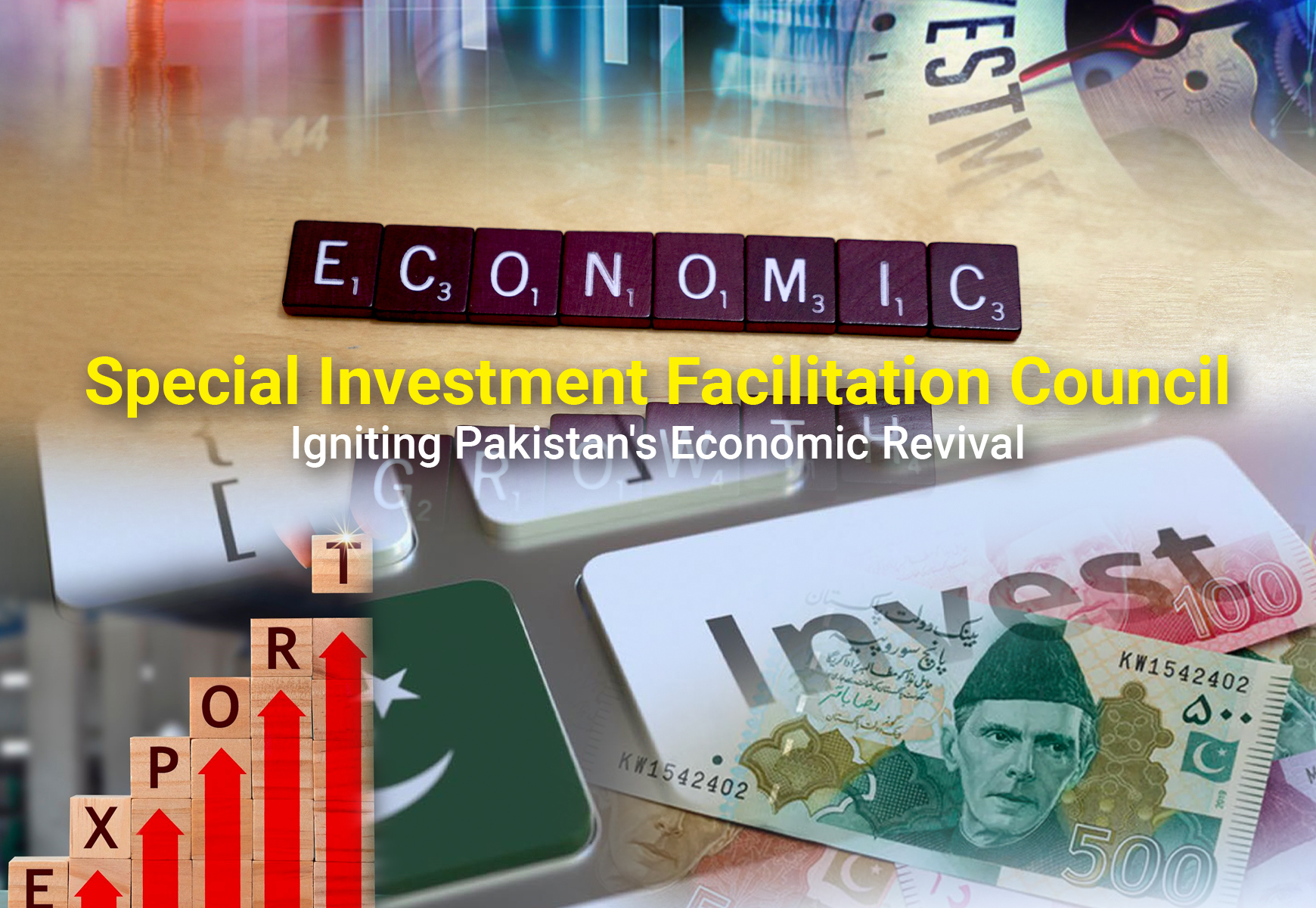|
Getting your Trinity Audio player ready...
|
Established under the guidance of Pakistan’s Ex-Prime Minister, the Special Investment Facilitation Council (SIFC) is a dedicated entity aimed at attracting overseas investments to fuel the economic advancement of the nation. Comprising Provincial Chief Ministers and the Army Chief, this council is focused on the urgent task of augmenting Foreign Direct Investment (FDI) in Pakistan to a substantial milestone of $5 billion.
Background of Special Investment Facilitation Council (SIFC): Addressing Economic Challenges
The genesis of the SIFC can be traced back to the pressing need for economic revitalization. Bureaucratic hurdles and complex regulations had been impediments to foreign direct investment (FDI). The SIFC emerged as a strategic response to these challenges, with a particular focus on fostering cooperation with Gulf Cooperation Council (GCC) nations.
Role and Function: Driving Structural Reforms
Functioning as a decisive platform, the SIFC is committed to spearheading crucial structural reforms within the economy. The initial emphasis is on unlocking the potential of key sectors, including information technology, agriculture, energy, mineral resources, mining, and defense production. A primary objective is to attract investments from allied nations.
Structure: An All-Encompassing Framework
The SIFC stands as an all-encompassing organization, featuring representation from federal and provincial stakeholders at various levels, along with the inclusion of Army representation for facilitation.
Within the SIFC structure, three committees are established: the Apex Committee, the Executive Committee, and the Implementation Committee.
Apex Committee: Guiding Force
The leadership of the Apex Committee rests with the Prime Minister, and it encompasses the Federal Cabinet, Chief Ministers of provinces, and the Chief of Army Staff, who is invited by the Government on special occasions. The Apex Committee is empowered to co-opt any member from any tier of the SIFC to enhance its representativeness and effectiveness. Scheduled for bi-monthly meetings, the committee will convene to review the progress made.
| Executive body | Designation |
| Prime Minister of Pakistan | Chairman |
| Special Assistant to Prime Minister on SIFC(SAPM) | Secretary to the Apex Committee SIFC |
| National Coordinator SIFC (CGS Pak Army) | Member |
| Ministry of Planning and Development | Member |
| Ministry of Finance | Member |
| Ministry of IT & Telecom | Member |
| Ministry of National Food Security and Research | Member |
| Ministry of Energy | Member |
| Ministry of Water Resources | Member |
| Ministry Industries and Production | Member |
| Ministry of Defence Production | Member |
| Ministry of Defence | Member |
| Chief of Army Staff | Member by special invitation |
| Provincial executive body | Designation |
| Chief Minister of Punjab | Member |
| Chief Minister of Sindh | Member |
| Chief Minister of Balochistan | Member |
| Chief Minister of Khyber-Pakhtunkhwa | Member |
Executive Committee: Implementing Vision
The Executive Committee, led by the Minister of Planning, Development & Special Initiatives, includes a National Coordinator representing the Pakistan Army. Additionally, it features representation from relevant Federal and Provincial Ministers, Federal Secretaries, Provincial Chief Secretaries, and the Secretary of the Board of Investment. Scheduled for monthly meetings, the committee will convene to conduct reviews of the progress achieved.
| Executive body | Designation |
| Ministry of Planning | Chairman |
| Special Assistant to Prime Minister (SAPM) on SIFC | Chairman SIFC Secretariat |
| Secretary SIFC Secretariat (Additional Secretary BOI) | Secretary Executive Committee |
| National Coordinator SIFC (CGS Pak Army) | Member |
| DG SIFC Secretariat (Major general Pakistan Army) | Member |
| Federal Ministry | Member |
| Ministry of Defence | |
| Ministry of National Food Security and Research | |
| Ministry of Energy | |
| Ministry of Defence Production | |
| Ministry of Finance | |
| Ministry of IT & Telecom | |
| Ministry of Petroleum | |
| Provincial Ministries Sindh, Punjab, Balochistan,and KP | Member |
| Ministry of Agriculture | |
| Ministry of Mines and Minerals | |
| Ministry of IT | |
| Ministry of Energy | |
| Ministry of Irrigation | |
| Ministry of Finance | |
| Ministry of Planning and Development | |
| Board of Revenues of Sindh, Punjab, Balochistan,and KP | |
| Chief Secretaries | Member |
| Chief Secretary Punjab | |
| Chief Secretary Sindh | |
| Chief Secretary Balochistan | |
| Chief Secretary Khyber Pakhtunkhwa |
Implementation Committee: Executing Projects
The Implementation Committee, under the leadership of the Special Assistant to the Prime Minister (SAPM), features representation from the Pakistan Army through the Director General (DG SIFC). This tier is structured with the SIFC Secretariat and Sectoral Divisions, tasked with planning, coordinating, and executing projects. Scheduled for bi-weekly meetings, the committee will gather to review the progress made in its endeavors.
| Executive body | Designation |
| Special Assistant to PM on SIFC | Chairman SIFC Secretariat |
| Director-General SIFC (Major General Pakistan Army) | Member |
| Secretary SIFC Secretariat (BPS-21 Additional Secretary Board of Investment) | Member |
Attracting Investments: SIFC’s Focus Areas
The SIFC directs its efforts towards fostering more seamless cooperation with GCC nations and unlocking investment opportunities across diverse sectors. The emphasis on information technology, agriculture, energy, and defense production underscores the council’s commitment to broad-ranging economic growth.
Challenges and Opportunities: A Realistic Outlook
While the SIFC holds immense promise, it is not without challenges. Complex geopolitical dynamics, bureaucratic inertia, and global economic uncertainties pose hurdles. However, the commitment to regular reviews and adaptability positions the SIFC to seize emerging opportunities and overcome challenges.
Success Stories: Early Glimpses
In its nascent stages, the SIFC has already shown promise. Collaborative efforts between federal and provincial bodies, coupled with the active involvement of the Army Chief, have set the stage for positive economic shifts. Early success stories highlight the council’s potential to be a catalyst for transformative change.
Future Prospects: Charting the Course
Looking ahead, the SIFC envisions a Pakistan that is not only open for business but also a preferred destination for global investments. The council’s focus on key sectors, coupled with its adaptive structure, positions Pakistan on a trajectory of sustainable economic growth and development.
Conclusion
The Special Investment Facilitation Council emerges as a beacon of hope in Pakistan’s pursuit of economic rejuvenation. Established with a clear vision and structured to overcome challenges, the SIFC is poised to play a pivotal role in shaping a prosperous future for the nation.
What is the primary objective of the Special Investment Facilitation Council?
The SIFC aims to attract foreign investments and drive economic growth in Pakistan, focusing on key sectors.
How often does the Apex Committee of the SIFC convene?
The Apex Committee holds bi-monthly meetings to review the progress made in various sectors.
What challenges does the SIFC face in attracting investments?
Challenges include geopolitical dynamics, bureaucratic hurdles, and global economic uncertainties.
What success stories have emerged from the early stages of the SIFC?
Collaborative efforts and active involvement of the Army Chief have set the stage for positive economic shifts.
How frequently does the Implementation Committee review progress and execute projects?
The Implementation Committee meets bi-weekly to plan, coordinate, and execute projects, reviewing progress and addressing challenges.


کمیٹی کو دیکھ کر اندازہ لگا لیں کہ کئ سال سے کیا یہی لوگ اسی مزاج کے سوچ کے لوگ کمیٹی کا حصہ نہی رہے